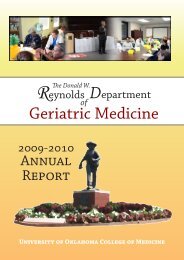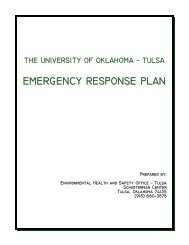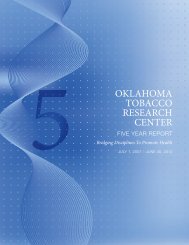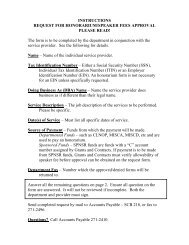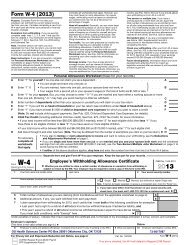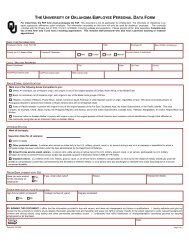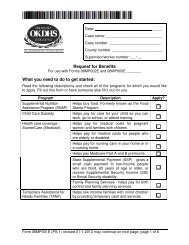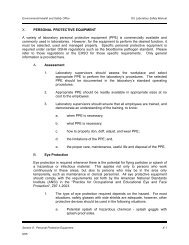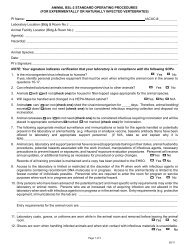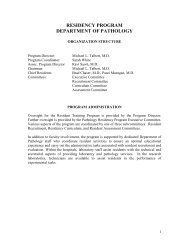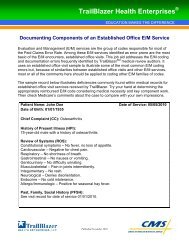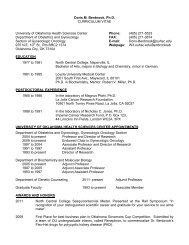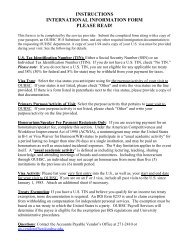The Unofficial Guide to First Year - University of Oklahoma Health ...
The Unofficial Guide to First Year - University of Oklahoma Health ...
The Unofficial Guide to First Year - University of Oklahoma Health ...
Create successful ePaper yourself
Turn your PDF publications into a flip-book with our unique Google optimized e-Paper software.
UNOFFICIAL GUIDE<br />
TEST BLOCK TWO:<br />
<strong>The</strong> emphasis within this test block will be on the kidney, cartilage, bone, respira<strong>to</strong>ry system,<br />
peripheral blood, hema<strong>to</strong>poesis, and integument. A word <strong>of</strong> advice, know the steps <strong>of</strong><br />
HEMATOPOESIS and the BLOOD SLIDES. Furthermore, Dr. Hanigan who will teach the<br />
integument and another section in test block three will not post her slides so you should pay<br />
attention in class and she will provide good slide examples.<br />
TEST BLOCK THREE:<br />
Test block three will consist <strong>of</strong> mainly lectures covering the endocrine, GI, and reproductive systems.<br />
<strong>The</strong>se will be the exact same things you will be studying in Physiology, and in fact, Dr. Greenwood who<br />
teaches the GI phys will teach GI his<strong>to</strong>logy so you get a great overlap. REMEMBER: Different types <strong>of</strong><br />
questions will be asked in the two classes so you must study for each test, but during finals you greatly<br />
appreciate the consistency <strong>of</strong> <strong>to</strong>pics. Some good advice is <strong>to</strong> always know the defining characteristics <strong>of</strong><br />
a tissue (Hassal’s corpuscles define the thalamus, etc.) For the GI section, make sure you know the<br />
differences in the four his<strong>to</strong>logical layers among the organs: mucosa, submucosa, muscularis externa,<br />
and serosa. Know the Iowa Website slides for organ identification and reinforce this with the His<strong>to</strong>logy<br />
Time CD. If you don’t’ know the organ, you can’t get the detailed questions. <strong>The</strong> slide portion <strong>of</strong><br />
this block can be more difficult than the others because <strong>of</strong> the amount <strong>of</strong> organs you have <strong>to</strong> identify –<br />
try <strong>to</strong> keep up with the slide portion <strong>of</strong> this exam as you go along. Furthermore, make sure you answer<br />
the questions according <strong>to</strong> how the material was presented in his<strong>to</strong>logy and not phys. (<strong>The</strong>re were a<br />
few differences!) For example, the two classes differ in their description <strong>of</strong> the different stages <strong>of</strong><br />
ovarian follicles. Know the different stages <strong>of</strong> sperm and follicle development. <strong>The</strong>y like <strong>to</strong> ask<br />
questions on these <strong>to</strong>pics. This exam was a marked step up in difficulty for us from the previous two<br />
tests and spoiled quite a few people’s A’s in the course!<br />
LAB EXAMS:<br />
Overall, Dr. Wiechmann is very fair in his selection <strong>of</strong> lab slides that will be presented during the lab<br />
exams. Focus your studying on the His<strong>to</strong>logy Time CD and Iowa Website. <strong>The</strong>re are practice quizzes<br />
online as well. Be sure and understand the big picture when studying the slides, and be able <strong>to</strong> identify<br />
a well-presented organ, structure, tissue, or cell. If you can do that, you will do very well. Some <strong>of</strong> the<br />
slides (especially during exam 3) will be simply "name this organ" <strong>of</strong> which most <strong>of</strong> the slides will come<br />
from the Iowa website. Dr. Wiechmann gives plenty <strong>of</strong> time <strong>to</strong> view one slide before proceeding <strong>to</strong> the<br />
next, and he is very good at showing specific structural characteristics <strong>to</strong> help the students correctly<br />
identify the slide. Also, remember <strong>to</strong> go <strong>to</strong> his review for the slides if he <strong>of</strong>fers one!<br />
HOW TO STUDY FOR EXAMS:<br />
Do not just cram it all in the night before! This will be a<br />
“<strong>First</strong> the doc<strong>to</strong>r <strong>to</strong>ld me<br />
the good news; that I was<br />
going <strong>to</strong> have a disease<br />
named after me”.<br />
- Steve Martin<br />
temptation because more than likely, his<strong>to</strong> will come a bit easier<br />
<strong>to</strong> you than neuro or phys. However, try <strong>to</strong> study before the week<br />
<strong>of</strong> test block. If you keep up with the material and look at the<br />
slides at least once the week they are presented, you won’t feel as<br />
overwhelmed the week or night before. Some early studying and<br />
keeping up with the material will prove very beneficial by the time<br />
his<strong>to</strong> test time arrives.<br />
97




